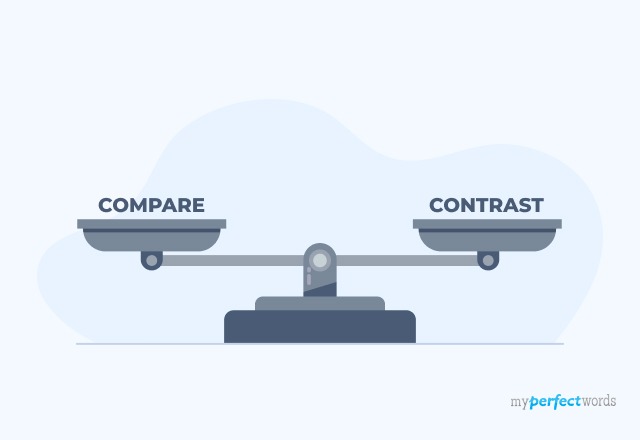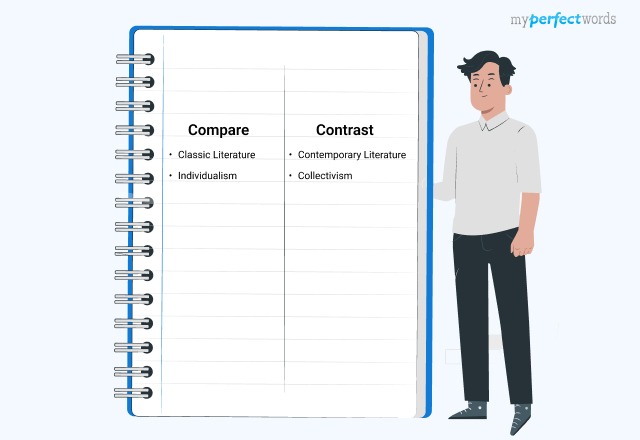What Is a Compare and Contrast Essay?
A compare and contrast essay is a form of academic writing where you examine the similarities and differences between two or more subjects, objects, ideas, or concepts.
This type of essay requires critical thinking to analyze and synthesize information and goes beyond simple description.
The aim is to point out the interesting details, similarities, and differences that come to light when you compare these subjects directly.
How to Write a Compare and Contrast Essay?
Writing a compare and contrast essay is about uncovering similarities and differences between two subjects.
Let's break it down into straightforward steps:
Step 1 - Use a Venn Diagram for Brainstorming
To start, use a Venn diagram, two circles overlapping on a page. In one circle, jot down the things that your two subjects have in common.

In the other circle, note down the aspects that make them different to clarify what the essay will compare. This visual tool acts like a roadmap, guiding you toward the key points you'll explore in your essay.
Here’s a practice table comparing and contrasting dogs:
| Categories | Cats | Dogs |
| Type of Animal | ||
| Common Breeds | ||
| Typical Size | ||
| Typical Behavior | ||
| Lifespan |
Need help with compare and contrast? Our professional essay writing service delivers.
Step 2 - Craft a Clear Thesis
Your thesis statement is your essay's compass. It should be concise, clearly outlining what you'll compare and contrast.
For instance, if writing an essay comparing pets, say you'll explore their care, behavior, and suitability.
A typical compare and contrast essay thesis statement follows this structure:
| [Subject A] is [similar/different] from [Subject B] in terms of [specific aspect(s) of comparison] |
"Online education is similar to traditional classroom education in terms of curriculum quality but different in terms of flexibility and student interaction." |
Step 3 - Create an Outline
An essay outline, like a blueprint, keeps your essay organized. Plan an introduction, body paragraphs, and a conclusion.
Start by planning out the structure of your essay, typically consisting of an introduction, body paragraphs, and a conclusion. Each body paragraph should focus on one main point of comparison.
Here’s a sample compare and contrast template:
I. Introduction II. Body Paragraph 1 III. Body Paragraph 2 IV. Body Paragraph 3 V. Conclusion |
Check out this guide and get in-depth knowledge on creating the perfect compare and contrast essay outline!
Step 4 - Write an Introduction
Start with a captivating opening, like a fact or a question. Briefly introduce both subjects and provide some background information on them.
Finally, end with your thesis statement, which is the heart of your essay. It tells your reader what you'll be comparing and contrasting along with clarifying the purpose of your essay.
Here’s an example of how to start a compare and contrast essay
| Public transportation and private cars are two of the most common modes of transportation used today, each offering unique benefits and challenges. While both aim to facilitate convenient travel from one place to another, they differ significantly in terms of cost, environmental impact, and flexibility. Understanding these differences can help individuals make informed decisions about their preferred mode of transportation based on their needs and priorities. In this essay, we will compare and contrast public transportation with private cars, focusing on their similarities in providing mobility and their differences in cost-efficiency, environmental sustainability, and convenience. |
Step 5 - Tackle the First Body Paragraph
In the body paragraphs, each addresses a single point of comparison. Begin with a clear topic sentence, e.g., "Both books feature complex characters." Support it with evidence or examples.
Step 6 - Repeat for Subsequent Paragraphs
Continue this pattern for other body paragraphs, each exploring different aspects of your subjects. For instance, design, features, and price in smartphone comparisons.
Step 7 - Craft a Reflective Conclusion
Summarize key points from your body paragraphs. Restate your thesis differently. Conclude with a thought-provoking idea or a call to action, leaving readers with something to ponder.
Here’s an example of how to end a compare and contrast essay:
| In conclusion, while both public transportation and private cars have their own advantages and disadvantages, the choice between them ultimately depends on individual preferences and circumstances. Public transportation offers cost-effectiveness and environmental benefits, making it a sustainable choice for many urban commuters. On the other hand, private cars provide unmatched convenience and flexibility, especially for individuals living in suburban or rural areas with limited public transportation options. By weighing these factors—cost, environmental impact, and convenience—individuals can make informed decisions that align with their transportation needs and values. Ultimately, whether one opts for public transportation or a private car, both contribute to the diverse landscape of modern transportation systems, catering to a variety of lifestyles and preferences. |
Step 8 - Proofread for Clarity
Before sharing your essay, proofread it carefully. Make sure you’ve used correct spelling, grammar, and punctuation.
Ensuring logical flow by reading aloud can help detect awkward sentences.
How to Structure a Compare-and-Contrast Essay?
When it comes to structuring, you can choose from these compare and contrast formats:
Block Method (Subject by Subject)
In this method, you delve deeply into one subject before transitioning to the next. It's like thoroughly exploring one side before moving to the other.
Example: Comparing Cats and Dogs
- Introduction - introduces both subjects.
- Body Paragraph 1 - delves into cats' characteristics.
- Body Paragraph 2 - explores dogs' characteristics.
- Conclusion - summarizes key points.
Alternating Method (Point by Point)
Here, you explore one aspect of each subject in sequence. It's like comparing specific points between the subjects.
Example: Comparing City Living and Country Living
- Introduction - introduces both living environments.
- Body Paragraphs - alternate discussing lifestyle, environment, and social interactions.
- Conclusion - summarizes comparisons.
- Similarities and Differences
With this method, you either discuss all the similarities or all the differences first and then cover the other aspects.
Example: Comparing Online Learning and Traditional Classroom Learning
- Introduction - introduces both learning methods.
- Body Paragraph 1 - covers similarities.
- Body Paragraph 2 - addresses differences.
- Conclusion - sums up the comparisons and offers insights.
Each method has its merits, so choose the one that suits your purpose and subjects best. Maintain clarity and coherence throughout your essay for effective communication.
Compare and Contrast Essay Examples
This type of essay can cover a wide range of topics, from literature and history to science and culture.
Now, let's explore some concrete examples that showcase how this essay format can be applied to various subjects and disciplines.
Need more examples? Have a look at our compare and contrast essay examples on different themes and grades!
Compare and Contrast Words
When comparing and contrasting, using appropriate transitional words is crucial to convey similarities, differences, and connections effectively. These words and phrases help to structure your writing and create a smooth flow of ideas.
Here’s a list of these terms:
Compare Words
- Similarly
- Likewise
- In the same way
- Just as
- Analogous to
- Correspondingly
- Equally
- As with
Contrast Words
- However
- On the contrary
- Conversely
- Unlike
- Nevertheless
- Conversely
- Whereas
- Although
- On the other hand
Good Compare and Contrast Essay Topics
Choosing the right topic for your comparison essay is crucial because it sets the stage for your entire essay. A good topic should be interesting, relevant, and allow for meaningful comparisons.
Here are some good compare and contrast essay ideas:
- Online Learning vs. Traditional Classroom Learning
- The Influence of Nature vs. Nurture on Human Development
- City Life vs. Rural Life: Contrasting Lifestyles
- Two Iconic Superheroes: Batman vs. Superman
- Democracy vs. Autocracy: Contrasting Forms of Government
- The Impact of Social Media vs. Traditional Media
- Two Prominent World Religions: Christianity vs. Islam
- The Roaring Twenties vs. the Swinging Sixties: Contrasting Decades
- Vegetarianism vs. Veganism: Dietary Choices and Ethical Considerations
- The Effects of Exercise vs. Diet on Health and Fitness
Can’t pick a topic? Check out our extensive list of compare and contrast essay topics to find more unique and interesting topics!
Tips for Writing a Good Compare and Contrast Essay
Writing a successful compare and contrast essay doesn't have to be daunting. Here are some practical tips to help you along the way:
- Be specific about what aspects or elements of the subjects you will compare and contrast. This helps maintain focus.
- When presenting similarities and differences, use parallel structure in your sentences to keep the essay organized and readable.
- Ensure that your comparisons are balanced. Don't spend too much time on one subject or aspect at the expense of the other.
- Use transitional words and phrases like "similarly," "in contrast," "on the other hand," to guide readers through your comparisons.
- Go beyond surface-level comparisons. Analyze the significance of the similarities and differences you present. Why are they important?
- Support your points with specific examples, quotes, or evidence. This adds depth to your analysis.
- Make sure your thesis statement is concise and clearly states the main points of comparison or contrast.
- In your conclusion, offer insights or reflections on what the comparisons and contrasts reveal about the subjects or the broader topic.
- Have someone review your essay to ensure that your comparisons are clear and make sense to a reader unfamiliar with the topic.
In closing, with the steps, examples, and valuable tips provided, you're well-prepared to craft an outstanding compare and contrast essay.
However, if you ever find yourself facing writer's block or tight deadlines, our you can buy compare and contrast essay from our professional writers.
Our experienced writers have helped countless students like you achieve top-notch quality in their essays.
So, why hesitate? Just place your request now and get writing assistance!




-9496.jpg)